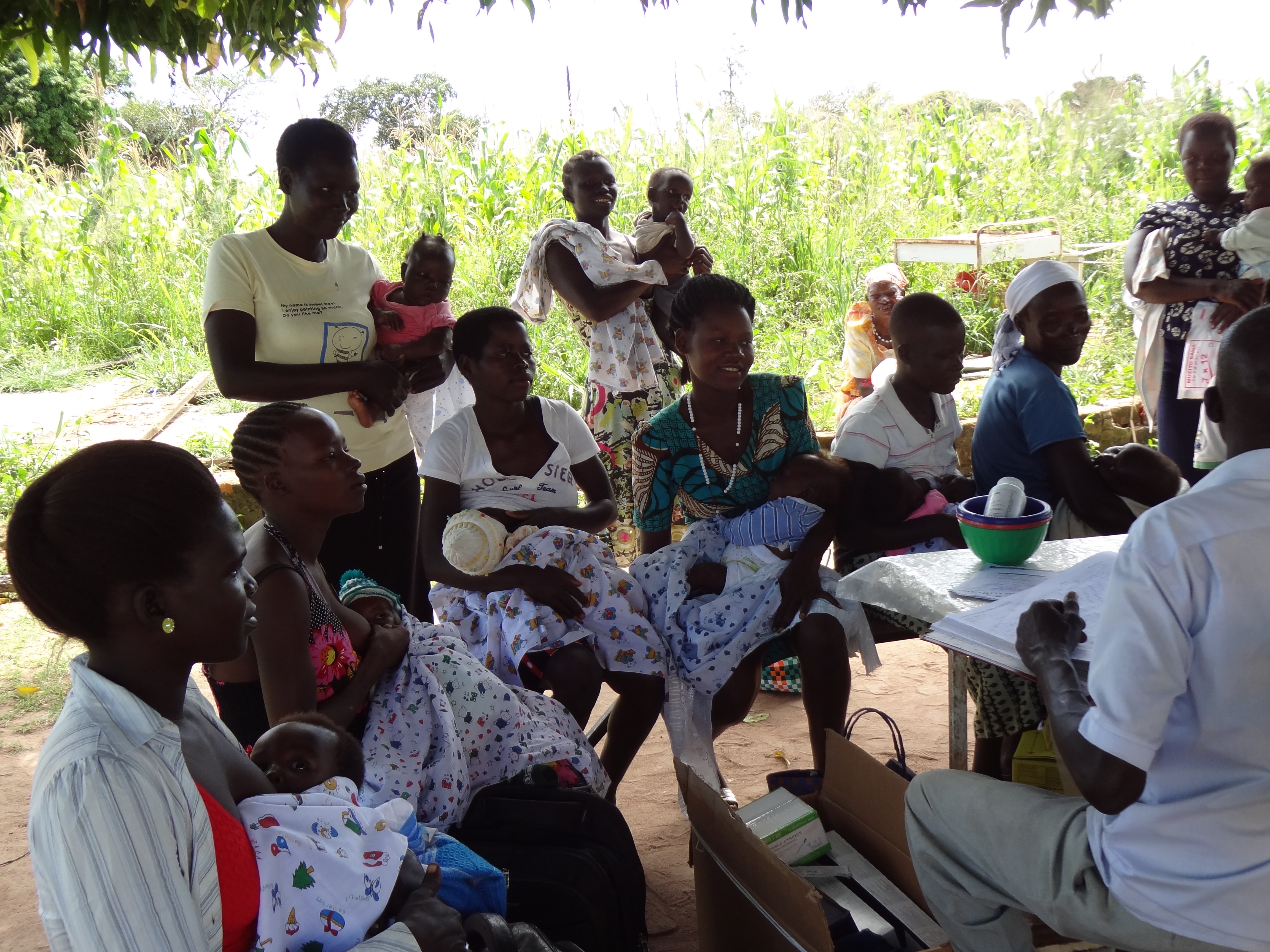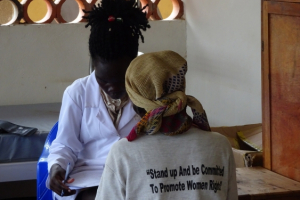Uganda is one of three target regions where the University of New South Wales aims to improve the lives of one million people by 2025. As a result of her humanitarian work in internally displaced persons camps in Kenya and her interest in and commitment to working with vulnerable and disadvantaged populations and communities in sub-Saharan Africa, the Vice Chancellor of the UNSW, Professor Ian Jacobs, invited Professor Robyn Richmond to lead the Transforming Community Health Program. This involves clinical services delivery, training community and academic leaders, research and education working in the university and communities located in northern Uganda. The focus is on improving the lives of people in northern Uganda.
Gulu University is situated in the north of Uganda, a region that has suffered decades of civil war and unrest resulting in upheavals with significant displacement of local people. As a result of wars, infrastructure such as health services and education has diminished.
The UNSW is committed to working in “partnership with disadvantaged and marginalised communities across the globe to improve social, health, and economic wellbeing to foster more equitable and just societies”. The UNSW aims to improve lives by connecting the work of researchers and people who need solutions to issues in their community; and by forging strategic partnerships with universities and NGOs in places like sub-Saharan Africa as well as Australia.
Research on women’s and children’s health Clinical service for women - screening for cancer
Humanitarian work in rural northern Uganda (close to the south Sudan border)
In August 2016, Professor Ian Jacobs, and a small delegation of senior professors from UNSW including Professor Robyn Richmond representing the Faculty of Medicine, traveled to Gulu in northern Uganda. The objective was to launch a long-term partnership between UNSW and Gulu University, and a memorandum of understanding was signed with the Vice Chancellor of Gulu University. A similar MOU was signed with the Vice Chancellor of Makerere University in Kampala. Over the years a tripartite partnership between UNSW, Gulu University and the Ugandan Ministry of Health has been forged.
The 5-year plan of the Transforming Community Health program in northern Uganda
Robyn Richmond has worked with the Gulu University Deans of Medicine, Dr Felix Kaducu and Associate Professor Emmanuel Moro, and developed a 5-year action plan for Transforming Community health in northern Uganda through clinical service delivery, research and education.
Cervical cancer and breast cancer are the most common forms of cancer among women and the leading causes of cancer deaths. The number of new cases of cervical cancer is 48/100,000 and increasing, whereas in Australia it is 7/100,000 and decreasing. The 5-year survival rate for Ugandan women is 13%, whilst among Australian women it is 72%. To prevent cervical cancer deaths in Uganda, identification and treatment of early disease is vital. The 5-year survival rates are 52% in Uganda, compared to 90% in Australia. Mammography is not feasible in Uganda, and there is one radiography machine in all of Uganda which broke in 2016 and was not replaced for almost 2 years. Breast self-examination is the most practical and affordable screening method.
The 5-year plan consists of:
Phase 1: Improving women’s health, capacity building of health professionals, and educational development of postgraduate courses for online delivery (2017-2021)
This north of Uganda has suffered from decades of civil war and political unrest resulting in rudimentary infrastructure including basic health care services. The aim was to improve the health of women by establishing a women’s cancer service across northern Uganda focusing on screening for cervical and breast cancer and treating pre-cancerous lesions. Women’s cancers services were launched in 2017 and they function within the existing health centres. Cryotherapy machines were donated by the UNSW and provided to health clinics in northern Uganda for the immediate treatment of identified precancerous lesions.
During 2017 and 2018, women’s cancer clinics were launched in health centres and nursing staff and clinical officers have screened around 2000 women for cervical and breast cancer and have treated precancerous cervical lesions.
Health centre staff were trained by gynaecologists from local hospitals and by experienced nurses. This program will be repeated in other health centres across northern Uganda each year. Around 50 nurses, midwives and clinical officers have been trained in the theory and practical methods of cancer screening. This number will be increased as further women’s cancer clinics are initiated each year.
Over the 5 years of the program, new areas of women’s health will be introduced including: health promotion; training of nurses in a range of preventive services; implement a mobile health clinic focussing on a range of health promotion and prevention services that travels around rural communities in northern Uganda providing health promotion, screening and treatments.
Research among women is being conducted in all Phases of the 5-year plan. In the first two Phases:
(1) A survey of women’s reproductive health and domestic violence in rural and urban northern Uganda was carried out. Over 1000 women have been participated in the study.
(2) A study of screening for breast and cervical cancer in the health centres following training of nurses and midwives in screening techniques has been conducted. More than 2000 women have been screened.
Educational development of the existing Master of Public Health program at Gulu University to online delivery. Developing education from face-to-face and paper-based to online and blended learning delivery enables postgraduate students across Sub-Saharan Africa to enrol in education programs and build their capacity in public health. This initiative includes evaluation by educational developers from both Gulu University and UNSW working together to assess viability and capacity of existing platforms and requirements for delivery of e-learning.
Phase II: Children’s health and capacity building (2019 - 2021)
Initiate screening of schoolchildren to determine their ear, eye and oral health and other childhood diseases and continue to focus on additional child health issues each year.
Commencing in 2020, HPV vaccinations will be provided to prevent cervical cancer among girls living in the settlements. Participation from paediatricians, public health practitioners, postgraduate and medical students from both universities.
Phase III: Non Communicable Diseases – cardiovascular and mental health (2020 - 2021)
Initiate services to reduce non-communicable diseases including a focus on alcohol and tobacco use, and improving nutrition and food security. Additionally, the aim is to improve mental health among people who have suffered decades of political violence.
Whilst infectious diseases have historically dominated in sub-Saharan Africa, rapid urbanisation is causing an increase in non-communicable diseases and cardiovascular diseases.
In Phase III, Robyn Richmond intends to initiate studies on non-communicable diseases including mental health. The people in northern Uganda have suffered from decades of political upheaval and violence and there is a great deal of post-traumatic stress.
The UNSW team will continue with developing and implementing online educational courses for postgraduate students at GU and other students in Sub-Saharan Africa, and continue development of further courses and postgraduate programs.
Phases IV and V (2020 – 2021)
In this phase Robyn Richmond and her team will consolidate public health programs in other health districts and regions in northern Uganda.
What has been achieved to date
Professor Robyn Richmond spends a large amount of time preparing for each trip she makes to work in northern Uganda on the range of health, research and education projects. She leads the UNSW academic staff and postgraduate students who accompany her to Uganda to launch the new cancer services for women across northern Uganda, conduct the health studies, and convert the face to face courses to online delivery. The UNSW team works closely with academic staff and postgraduate students from Gulu University on the long journey of transforming community health of women living in rural communities in northern Uganda. The Head of the Department of Public Health at Gulu University, James Henry Obol, is integrally involved in the women’s screening project. He is a PhD student supervised by Robyn and studying at the UNSW.
Please click on the links below to read the news articles published on the work conducted in 2017 and 2018.
UNSW transforms the lives of women in northern Uganda
Ugandan women benefit as health program enters fourth year
Key stakeholders’ comments on the work of the Transforming Community Health Program
The Transforming Community Health project has the strong support the Minister for Health, the Hon Dr Joyce Kaducu from the Ugandan Ministry of Health; the Director-General and Commissioners from the Ministry of Health in Kampala; numerous nurses and midwives in northern Uganda; key stakeholders and senior academic staff of the Faculty of Medicine at Gulu University. The Transforming Community Health program complements the health action plans outlined by the Ugandan Ministry of Health.
The comments from key stakeholders in Uganda attest to the success of the venture:
- Gulu University’s former Dean of Medicine, Prof Emmanuel Moro, said “the engagement and support from key stakeholders (Ministry of Health and district health leaders) has been “really well done” as stakeholders have expressed collaboration and ownership of the project. This work has helped “to guide the ship”.
- Current Dean of Medicine at Gulu University, Dr Felix Kaducu said at a meeting: “we have had many overseas organisations and universities who have wanted to work with us. But all of them have failed, except our partner at the University of New South Wales, Robyn Richmond. This is because we have developed a partnership in which the UNSW has not taken over, but has supported Gulu University in delivering this project”. Saying directly to Professor Richmond: “Robyn, your presence has added great value to this project. I sincerely thank you”.
- “The community outreach mobile health clinic project fits in exactly with our current activity in which Gulu University medical students are located for 6 weeks in communities in northern Uganda. The students will have the opportunity to work with students and academics from UNSW on this project” (Dr Felix Kaducu).
- The comments from the stakeholders include remarks by the Honorable Rose Abili representing local government: “We are yearning for this type of partnership. Cervical cancer has caused many deaths. My dream is that women and children stay healthy and don’t pass on before their time”. “We have a very serious poverty level in this region. Referral to Mulago Hospital can be difficult. It can be expensive for women to go to hospital”. She said she was committed to discussing the project with district health officers.
- Dr Joyce Moriku Kaducu, paediatrician and the Minister of Primary Health in Kampala said that: “the 5-year plan developed by Robyn Richmond and Felix aligns exactly with what the Ministry of Health wants to carry out in northern Uganda”.
- The medical Director of the Awach Health Centre IV clinic said: “I am very excited about this project and I am sure this project will succeed”.
- The medical Director of the Lalogi Health Centre IV clinic expressed: “I am very excited about the mobile health clinics. I really want to participate in this project”.
- Patrick, one of the District Health Directors said: “the collaborations between the major players, such as the district health clinics, Ministry of Health and the two universities are very good”. He asked that any equipment bought for the project be left in the health clinics. He really liked the different levels of mobility, especially mobilising the women to come to level IV health clinics for treatment.
- The head nurse from Mulago hospital said: “the main problem for women is that when they are diagnosed for treatment, they cannot afford to come to hospital for therapy. This project enables women to be treated who otherwise would not have travelled for treatment”.
Professor Robyn Richmond’s humanitarian work in Uganda and Kenya in Sub-Saharan Africa serves to further the goals of both the Australian Government and the University of New South Wales. Her work is guided by the United Nations Sustainable Development Goals which “set timebound targets by which progress in reducing income poverty, hunger, disease, lack of adequate shelter and exclusion - while promoting gender equality, health, education and environmental sustainability - can be measured. They also embody basic human rights - the rights of each person on the planet to health, education, shelter and security”.
Humanitarian work in internally displaced persons’ camps in Kenya
The 2007 presidential elections in Kenya were followed by significant ethnic violence. Tribes were forced out of their homes and businesses, and around 600,000 people were displaced and fled across Kenya, and were interned in internally displaced persons’ (IDP) camps. People residing in IDP camps are very vulnerable to numerous public health problems related to limited resources, poor sanitation, severe overcrowding and extremely poor nutritional status and health. Women in the IDP Camps are at high risk of infection resulting from sexual violence and are disproportionally affected by HIV.
In 2012 and 2013 Professor Robyn Richmond led teams of UNSW academic staff, postgraduate students and medical students to work in health projects and research in internally displaced persons camps in the Rift Valley in Kenya. In 2012, Robyn and her team interviewed women about reproductive and sexual health who resided in the Pipeline IDP Camp of 6,500 people. Robyn Richmond found that the living conditions were extremely poor, overcrowded and unsafe with children playing with broken glass around open wood and oil fires. Women living in these environments faced barriers to adequate health care facilities such as lack of transport to hospital during labour, poor literacy and education. Access to sanitation and potable water was well below the Kenyan average. The women identified a borehole or tube well as their primary source of water. Sanitary arrangements were poor, with almost half using overflowing pit latrines. Of even greater concern was the number who used the surrounding bush rather than sanitation facilities. Few owned a bednet and malaria was common. Despite the illegality of female circumcision in Kenya, they found that it was still commonly practised.
In June 2013, Professor Robyn Richmond and her UNSW team visited the Shalom City IDP Camp in Rongai in the Rift Valley, Kenya. At that time, the Shalom IDP camp was home to 444 families displaced as a result of the 2007 violence. Five years on, many were still trying to re-establish their lives and provide a better future for their children. Richmond and her team surveyed women on nutrition, food security, reproductive health and antenatal care, and the men on cardiovascular risk factors. Her work was enthusiastically supported by the people in Nakuru including: the IDP Camp Chief, the local hospital, the health clinic, and the public health officers located in Nakuru. Robyn Richmond met many senior members of the local government during her time in Kenya including the Deputy Governor of the Nakuru region, the local member of the Legislative Parliamentary Assembly, several members of the Office of the President for Nakuru District in the Rift Valley, and the National Director of the Internally Displaced Persons Camps in Kenya. Reports of the health conditions in the Camp were sent to the local public health department, the people living in the camp, and the local member of Parliament.
Robyn Richmond worked with the late Professor Elizabeth Ngugi from the University of Nairobi, Kenya, who ran separate workshops for both women and men in the camps on reducing the prevalence of HIV by using safe sex practices. Local public health officers were trained in public health evaluations.
During 2013, time was spent at the newly established Springs High School in Rongai. There was no evidence of books and the significant need for a school library became apparent. After her return from Africa, Robyn Richmond sourced books to establish the Springs High School Library to provide a much needed resource for high school students. To date, funds have been provided for shelving, and over 2000 books have been sent to Springs High School Library. (please click on link to an article in the SPHCM Globe newsletter about the library).
Robyn Richmond’s work involved considerable time in preparation throughout the year and time on the ground in Kenya. Much of the time devoted to this project was on a voluntary basis. Her work in Kenya among very vulnerable displaced people provided a firm basis for her humanitarian work in Uganda.
Humanitarian work in internally displaced persons' camps in South Sudan
South Sudan has witnessed multiple conflicts. WHO estimates that over 7 million people are vulnerable and in need of humanitarian assistance. Repeated displacement has also resulted in large numbers of the population living in forests, swamps and in Protection of Civilians (POC) sites. Of those displaced, approximately 1.9 million are internally displaced South Sudan has witnessed multiple conflicts, with the most recent breaking out in 2013. WHO estimates that over 7 million people are vulnerable and in need of humanitarian assistance. Repeated displacement has also resulted in large numbers of the population living in forests, swamps and in Protection of Civilians (POC) sites. Of those displaced, approximately 1.9 million are internally displaced.
Robyn Richmond is planning to initiate health clinics to screen and treat women for HPV and cervical pre-cancer, which accounts for 20% of all new cancer cases in South Sudan. This will utilise an innovation enabling low cost, self-administered HPV swabs with same day testing and treatment for participants. This approach provides for greater privacy in traumatized female populations and as a result, potentially greater take up.
Professor Robyn Richmond’s humanitarian work in Sub-Saharan Africa serves to further the goals of both the Australian Government, and the University of New South Wales. Her work is guided by the United Nations Sustainable Development Goals which “set time bound targets by which progress in reducing income poverty, hunger, disease, lack of adequate shelter and exclusion - while promoting gender equality, health, education and environmental sustainability - can be measured. They also embody basic human rights - the rights of each person on the planet to health, education, shelter and security”.




